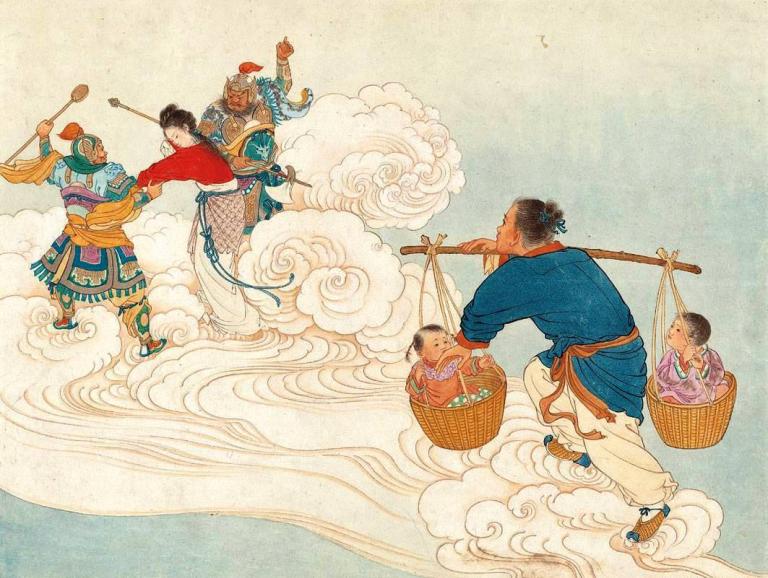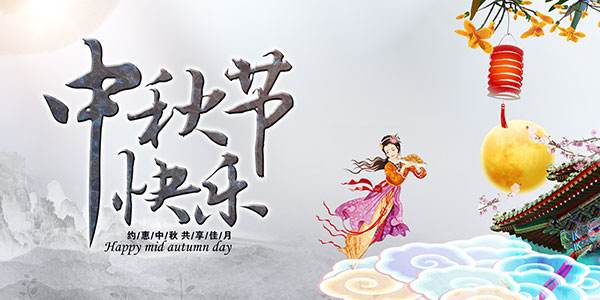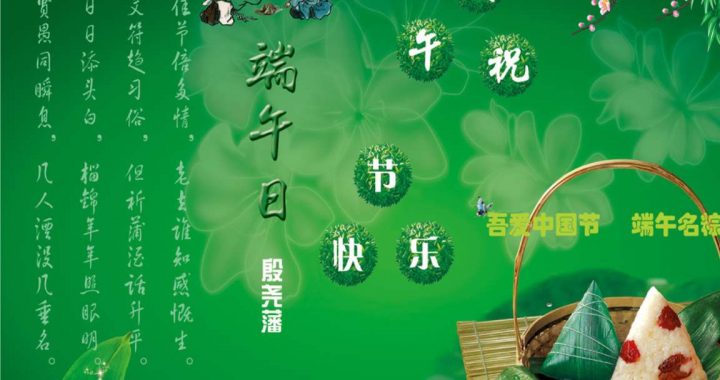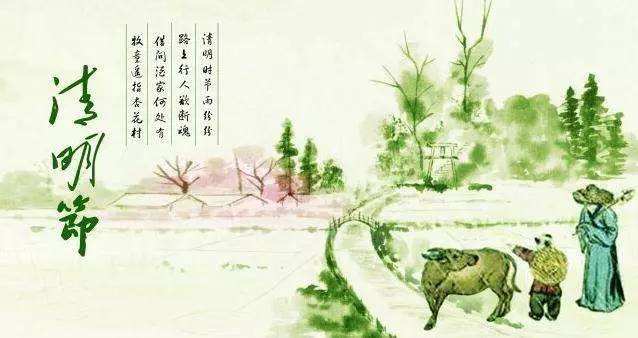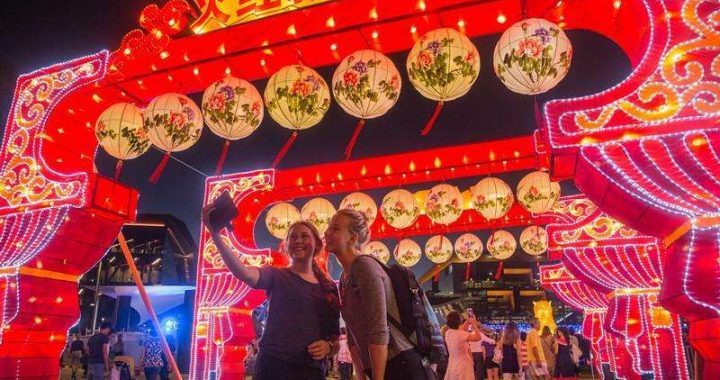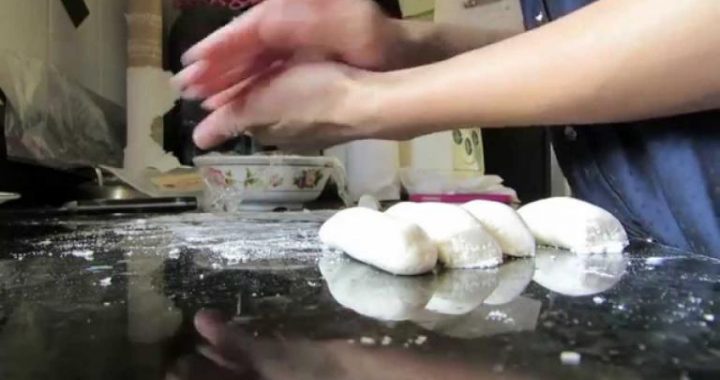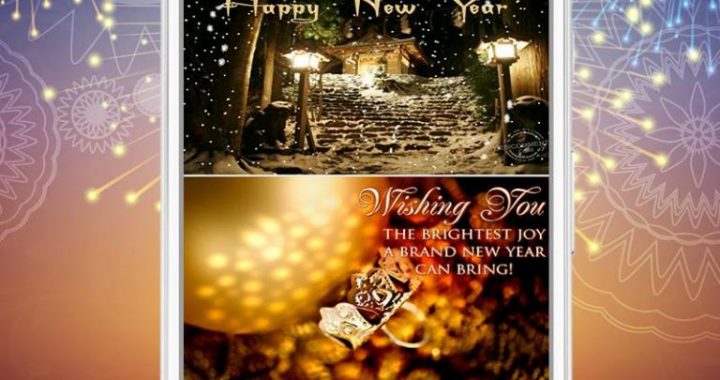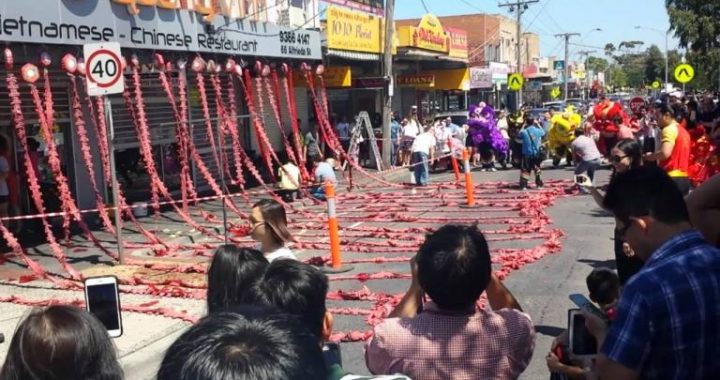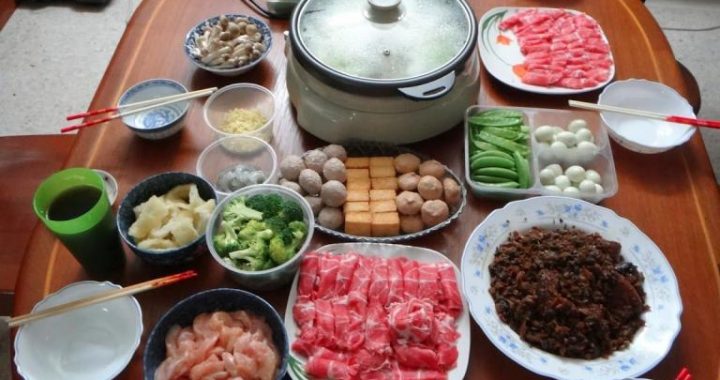Double Seventh Festival and The Cowherd and the Weaver Girl
9 min readLove is an eternal theme of human society. In ancient Chinese society, there were numerous ethical and moral restrictions on contact between men and women:”it was improper for men and women to touch each other’s hand in passing objects,”women “never left home and had little contact with the outside world,”children’s marriages “should be arranged by parents and matchmakers,”and the husband and wife even never met before marriage. However, ancient Chinese society was not always like an apologist because China’s festival culture opened a window for man to express, eulogize and pursue love.
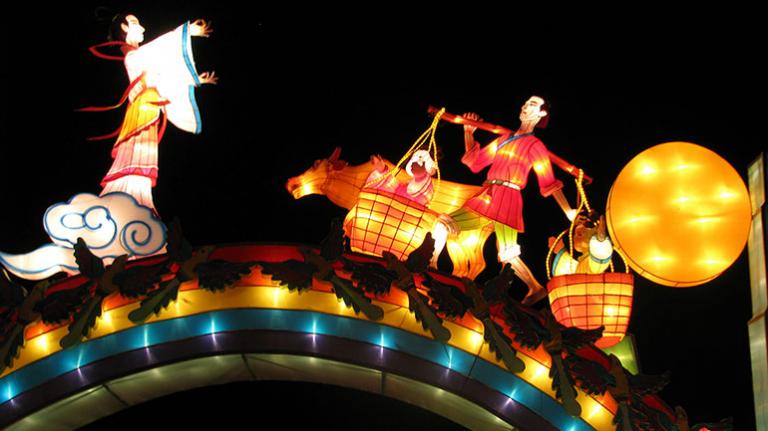
These festivals include flower fairs popular in Qinghai, Gansu and Ningxia and the Double Third Festival in Guangxi and Guizhou. In areas inhabited by Chinese minority ethnicgroups, these festivals are very common. In the times when the modes of interpersonal communication were restricted by time and space, people gathered on hill slopes, in forests or on threshing grounds in spring when flowers are in full bloom, in supper when the sun is scorching, in autumn when the weather is fresh and cool or in winter when snow falls tocommunicate happily together in the name of festivals, make friends through singing and express love through singing. This mode of establishing love relationships and marriages through festival communication objectively promoted man’s multiplication.
Double Seventh Festival: the Cowherd and the Weaver Girl
Under the influence of modernization and globalization, the Western Valentine’s Day receives more and more attention from China’s young generation and is very popular. In comparison, China’s indigenous and traditional Double Seventh Festival known as the”Oriental Valentine’s Day”shows a declining trend. Of course, with the inheritance of China s traditional festival culture, the gradual enhancement of protection awareness and the constant updating of traditional festival customs’ contents in recent years, the significance of the Double Seventh Festival as a festival of dating and love was more and more valued, and people began to attach importance to this festival again.
The Double Seventh Festival,ie.the 7th day of the 7th lunar month,is a very ancient Chinese festival.According scholars’analysis of records in Monthly Ordinances for the Four Classes of People written by Cui Shi in the Eastern Han Dynasty(25-220),the Double Seventh Festival had become a festival with particular customs in the late Eastern Han Dynasty at the latest. Back then, in the first few days of the 7th lunar month, people produced yeast and brewed wine, made pillars for expelling worms with Chinese mugwortleaves, and exposed scriptures and Confucian classics to the sun.”Today, most of these festival customs are very strange to most Chinese people, but the legend of the Cowherd and the Weaver Girl about the Double Seventh Festival is quite familiar to them.
Ancient Chinese people acquired a deep understanding of the vast starry sky very early.The starry sky was a compass and map for people travelling far away. They relied on the Big Dipper consisting of seven stars always hanging in the north sky and Orion consistingof three shiny stars always glittering in the south sky in winter every year to determine positions and directions. Movement of stars in the night sky heralded passage of time and change of seasons, and people also felt the change of time from it and arranged the rhythm and cycle of labor in four seasons. By looking up at the starry sky, people not only summarized a complete set of astronomical knowledge through long-term observation of them, established relationships closely related to people’s production and life, and named numerous skies in the sky, brought them into the mundane world and stories, put emotions into them, and narrated numerous popular lively stories about the starry sky and the world.
The story of the Cowherd and the Weaver Girl is related to two stars in the sky-the Cowherd and the Weaver Girl. The general idea of the story is as follows:
In ancient times, there was a poor young man from a poor family. Both of his parents were dead, and his elderly brother and sister-in-law coveted family property, divided up family property and only gave him an old cow. So he was accompanied by the old cow all day, and neighbors called him the Cowherd. The Cowherd was an honest young man, and carefully fed the old cow. One day, when grazing the old cow, the cow suddenly began to talk, and told him that seven fairies would bathe beside the river someday. It asked the Cowherd to secretly hide a fairy’s clothes after their entry into water, so this fairy unable to find clothes would be his wife. She was the Weaver Girl in the sky. According to the old cow’s instructions, the Cowherd married the Weaver Girl happily, and they gave birth to two children. After a long time, the cow became old. Before death, it asked the Cowherd to keep its hide and use it at a crucial moment. As expected, one day the Queen Mother of the West dispatched troops from heaven to take away the Weaver Girl who got married in the world without permission. Seeing his beloved wife being taken to the sky, the Cowherd put on the cow hide desperately, lifted up his children with a carrying pole, and chased in the sky. As he got nearer and nearer, the Queen Mother of the West took out a gold hairpin anc scratched a river in the sky to block the Cowherd’s way. Thus, the devoted husband and wife were separated forever-one lived to the east of the river, and the other lived to the west of the river. They looked at each other on both sides of the river and could not reunite.
Later, the Jade Emperor thought they were pitiable, so he permitted them to meet on the 7thday of the 7th lunar month every year and summoned magpies in the world to build a bridge for the Cowherd and the Weaver Girl in the sky.
This sad story coincides with the stars in the sky. The river in the sky is the Milky Way we see. The brightest star to the west of the Milky Way is the Weaver Girl, belonging to Lyra in the Western constellation system. To the southeast of the Weaver Girl are one big star and two little stars forming one line on the other side of the Milky Way. The star in the middle is the Cowherd, and the two less bright stars are his children. In the Western constellation system, the Cowherd belongs to Aquila. Ancient people vividly related the Double Seventh Festival to the story of the Cowherd and the Weaver Girl, interpreted theextremely moving love between a man and deity, and associated this festival with eternal love and sentiment.
In ancient times, the Double Seventh Festival was very important for women because it was a festival of prayer for cleverness. In ancient times, the needlecraft skill was women’s basic skill, and a woman’s needlecraft ability bore on her marriage and evaluation of her family. The Weaver Girl was a deity in charge of spinning and weaving, and was much worshipped by girls wanting to acquire greater skill naturally. On the 7th day of the 7th lunar month, girls prayed for cleverness to the Weaver Girl in courtyards. In different periods and different regions, girls prayed for cleverness in different ways. In the Southern Dynasties(420-589), women not only dedicated melons, fruits and sacrifices and prayed for cleverness in silence, but also threaded needles and showed their hand skill. According to Dreams of Splendor of the Eastern Capital by Meng Yuanlao, the customs of prayer for cleverness were more diversified in Bianliang, the capital of the Song Dynasty. On the 1st day of the 7th lunar month, the prayer for cleverness market opened and various articles related to prayer for cleverness were sold. On the 7th day of the 7th lunar month, rich and influential families placed melons, fruits, writing brushes, ink stones, needles and threads in festoon buildings in their courtyards, also called “prayer for cleverness buildings.”
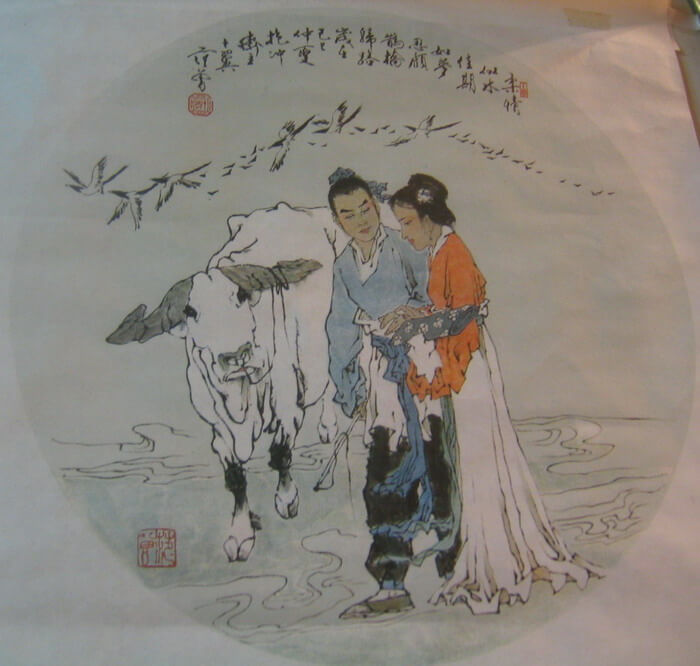
The sad love story and the customs of pious prayer for cleverness are also important themes exaggerated by scholars of past dynasties.The most famous poem is Far,Far Away the Cowherd Star in Nineteen Ancient Poems:
Far,far away the Cowherd Star;bright,bright riverside Weaving Maid.
Slender,slender her fingers are;Clack,clack her shuttle’s tune is played;She weaves all day,no web is done;like rain her tears drop one by one.
Heaven’s River’s shallow and clear;the two stars are not far apart.
Where brimful,brimful waves appear;they gaze but can’t lay bare their heart.
The Double Seventh Festival is another scene in China’s southeast coastal region.The customs of prayer for cleverness declined in most areas in modern times but are still thriving in many areas of Guangdong.Guangdong has the custom of worshipping Seven Mother Goddesses during the Double Seventh Festival.The so-called”Seven Mother Goddesses”refers to the seven fairies.Today,quick-witted and nimble-fingered girls in Zhu Village,Guangzhou also place various handiworks made by them carefully on tables as articles of tribute during the Double Seventh Festival.These handiworks include memorial archways made with paper of different colors,double seventh toys made with sequins and color cloth,fairy clothes made with paper of seven colors,winter sweet flowers molded with wax,and various melons and fruits made with foamed plastics.Double seventh toys are quite diversified,including not only dragons,phoenixes and peacocks,but also dramafigures or life scenes such as the Cowherd and the Weaver Girl’s magpie bridge meeting and Hua Mulan’s enlistment.On the day of the festival,various activities of worship andprayer for cleverness are also held.Besides,in the east of Fujian and Taiwan,there is a special custom of the Double Seventh Festival-“worshipping the God of Literature and Writing.”The God of Literature and Writing protects men of letters,and people worship the God of Literature and Writing mainly to pray for success in examinations.Different fromworship of the Weaver Girl,men play a leading role in worshipping the God of Literatureand Writing.While worshipping the God of Literature and Writing,people lay altar tables and burn joss sticks in worship.After worship ends,all people in the family sit together,drink wine and enjoy themselves.
Daughters in Zhu Village participating in an activity of the Double Seventh Festival happily All the above festival customs are lost in today’s Double Seventh Festival in China, but the meaning of the festival as a lovers’ festival has undergone tremendous development.
The story of the Cowherd and the Weaver Girl’s meeting on the magpie bridge over the Milky Way is full of romantic love. The Milky Way Match,a famous traditional Chinese drama, tells their story. Plots such as the Weaver Girl’s descent to the world, the Cowherd’s enlightenment, the formal wedding ceremony, separation by the Milky Way and meeting on the magpie bridge spread widely through opera and are deeply rooted in people’s hearts.A man tills land and a woman weaves cloth, and they are kind to each other and love each other. This life picture is ordinary Chinese people’s plainest dream about life. The Cowherd and the Weaver Girl who miss and watch each other on both sides of the Milky Way and meet and whisper once a year have moved and fascinated many men and women. Longing for such love is among traditional Double Seventh Festival customs. People say that in the evening of the Double Seventh Festival, words whispered by the Cowherd and the Weaver Girl during their meeting can be heard in a melon patch or under a plum tree. Therefore, in the past, many girls in the countryside of Shaoxing Zhe jiang hid beneath sheds of pumpkins growing exuberantly, hoping to hear the Cowherd and the Weaver Girl’s conversation in the still of night and wishing to get such everlasting love. Today, the Double Seventh Festival has already become an important festival for lovers. During every Double Seventh Festival, lovers in pairs can be seen everywhere in cities’ shopping malls, cinemas, restaurants and parks. They hold fresh flowers in their hands, give gifts to each other, fall deep in love, and feel joy and happiness. Traditional customs such as prayer for cleverness and worship have been replaced by lovers’ dating!
